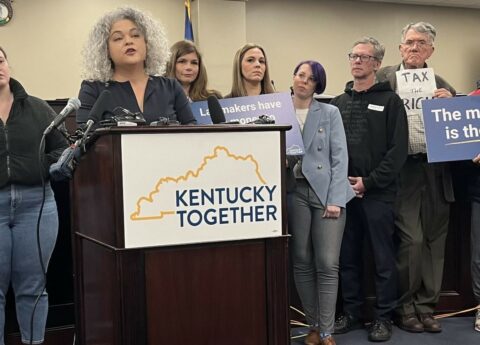Undocumented immigrants living and paying taxes in Kentucky would increase their contributions under the Obama administration’s executive actions, according to a new study by the Institute on Taxation and Economic Policy (ITEP). Such payments would increase even more under comprehensive immigration reform.
ITEP’s study, “Undocumented Immigrants’ State and Local Tax Contributions,” estimates that 48,000 undocumented immigrants in Kentucky currently pay $39 million annually in state and local taxes. As many as 20,000 Kentucky immigrants eligible to benefit from President Obama’s 2012 and 2014 executive actions are expected to pay $6 million more once the measures are fully in place. Granting lawful permanent residence to all immigrants in the state would increase those contributions by an estimated $17 million.
“Like all people living and working in Kentucky, undocumented immigrants pay sales and excise taxes when they purchase items ranging from clothing to gasoline. They pay property taxes as homeowners and renters. Many also pay state income taxes,” said Anna Baumann, research and policy associate at the Kentucky Center for Economic Policy. “Reform would increase those contributions by providing legal channels for full compliance and by increasing immigrants’ income-earning potential.”
President Obama’s 2012 and 2014 executive actions grant temporary immigration relief status to youth who have resided in the country for at least five years and parents of U.S. citizens or legal residents. Currently, the 2014 action is caught up in legal challenges and oral arguments are expected to be heard on April 17 in the 5th Circuit Court of Appeals.
Nationwide, undocumented immigrants contribute about $11.8 billion in taxes. This would go up by about $845 million under the Obama administration’s executive actions and would increase by $2.2 billion under comprehensive reform.
The benefits of immigration reform aren’t limited to the tax system: The Council of Economic Advisers (CEA) and the Center for American Progress (CAP) both estimate the president’s executive actions will have positive effects on labor market growth and productivity, as well as wages and economic growth. The CEA estimates that the executive actions would increase national GDP by 0.4 percent over 10 years, while having no impact on the likelihood of employment for U.S.-born workers.
To view ITEP’s full report with state-specific data, click here.
###
The Institute on Taxation and Economic Policy (ITEP) is a non-profit, non-partisan research organization that works on federal, state, and local tax policy issues. ITEP’s mission is to ensure that elected officials, the media, and the general public have access to accurate, timely, and straightforward information that allows them to understand the effects of current and proposed tax policies. ITEP’s work focuses particularly on issues of tax fairness and sustainability. ITEP works directly with lawmakers, non-governmental organizations, the public, and the media to achieve these goals.



